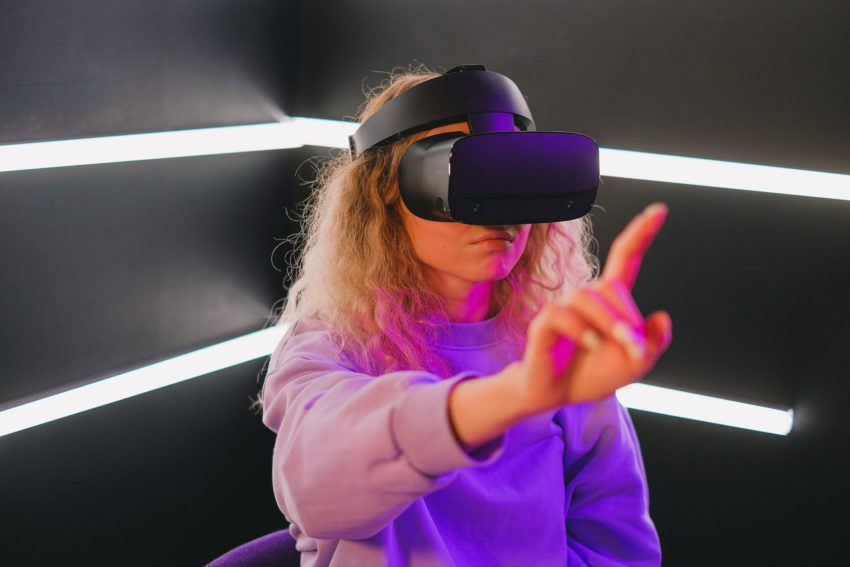Future of VR in Video Game Development
Future of VR in Video Game Development have come a long way since their inception. They have evolved from classic arcade games to realistic, immersive experiences with stunning graphics, and sound effects.
Now, imagine taking this experience to another level by incorporating virtual reality into video game development. VR gaming is the future of video games and is already making waves in the industry. In this blog, we will explore the future of VR in video game development.
We will compare VR gaming to traditional gaming and discuss its advantages such as an immersive experience, increased engagement, improved motor skills, enhanced social interaction, realistic simulations, and therapeutic benefits.
But with all the benefits come some challenges too. We will dive into those challenges and explore famous VR game trends and what makes VR games better than traditional ones while also addressing common concerns that come along with it.

Future of VR in Video Game Development
With the rapid growth of VR technology and its widespread adoption among gamers in recent years, the future of VR in video game development looks promising.
Through its immersive experience and enhanced gameplay experience, VR has already made a significant impact on gaming. Game developers can use VR to create innovative games that immerse players in a virtual world like never before.
The potential for revolutionizing multiplayer gaming by enabling players to interact in virtual spaces is also one of the key advantages of VR gaming. As this niche continues to develop and new innovations emerge – such as AI and AR – the future of VR gaming holds exciting possibilities for different industries beyond just the video game industry.
Comparing VR Gaming to Traditional Gaming
While comparing VR gaming with traditional gaming there are significant differences. One of the primary distinctions is that VR gaming provides a more immersive experience than traditional gaming. It also requires specific additional hardware like the latest virtual reality headsets which could be expensive than regular ones.
The VG industry is still exploring different possibilities with this technology while Game Developers have already started working on innovative game mechanics using Virtual Reality tech. However still Traditional Gaming dominates with its wider game selection options and affordable prices. While keeping the same level of entertainment intact for the players.
With constant advancements in technology & growing demand from gamers both sectors have their own niches for different audiences. But surely the Future of Gaming lies within both these sectors combined catering to every type of gamer out there.
Advantages of VR headset Games
VR Gaming offers an immersive and interactive gaming experience by utilizing advanced Virtual Reality Technology. Players can explore new virtual worlds through VR headsets and controllers. While also having unique experiences that cannot be replicated through traditional gaming methods.
This technology has opened up opportunities for innovative games across different industries like healthcare. Though expensive compared to traditional gaming methods, the benefits of improved motor skills and enhanced realism make it a worthy investment for gamers looking for something beyond the ordinary.
With rapid growth in recent years and widespread adoption across different niches. From automotive to real estate industries; The future of VR Gaming looks bright.
Immersive gameplay Experience
Immersive gameplay is one of the biggest advantages of VR games. It allows players to become part of the virtual world and offers an unparalleled level of interactivity. By allowing them to interact with objects and characters realistically.
This feature creates a unique gaming experience that cannot be replicated with traditional gaming methods. With recent years witnessing a rapid growth in VR market. We can expect further innovations in different industries such as healthcare and automotive industry for instance. As VR technology continues to evolve rapidly, it is paving the way towards the future of virtual reality gaming. Which would cater to wider audience while enhancing immersion within video games.
Increased Engagement
Players’ engagement is one of the major advantages of VR games. The immersive experience provided by VR technology allows players to feel like they are part of the virtual environment. This level of immersion leads to increased enjoyment and longer play sessions that result in greater satisfaction for gamers.
In addition to this, VR gaming offers unique gameplay mechanics that are not possible with traditional gaming methods. For instance, players can physically interact with objects in the game world using controllers or headsets. The rapid growth of the gaming industry has led to widespread adoption of VR equipment across different industries. Like healthcare and automotive. It is expected that future innovations in AI and AR will further enhance the immersive experience provided by VR games.
Improved Motor Skills
VR gaming has rapidly grown in recent years, and it’s no secret that it’s the future of gaming. It provides an immersive experience that requires players to physically move and interact with objects in the virtual world. VR gamers feel like they are part of the game world, and this level of immersion results in increased player engagement and enjoyment.
The use of VR technology opens up new possibilities for game design and storytelling by providing a fully immersive experience. One advantage of VR games is that they can improve hand-eye coordination, dexterity, spatial awareness, and reaction times which are essential skills needed in fields such as sports or surgery.
However, motion sickness or headaches may arise as an adverse effect during gameplay. With further advancements in VR technology, we can expect even more advanced and immersive gaming experiences in the future.
Enhanced Social Interaction
Multiplayer VR games offer an immersive social experience that enhances communication and interaction between players. By enabling non-verbal communication such as hand gestures or facial expressions to be incorporated into gameplay in virtual reality (VR) environments, players can feel like they are actually sharing the same physical space as their friends.
This sense of presence fosters deeper relationships among gamers and can lead to a wider audience for the gaming industry. With the rapid growth in recent years of the VR market and its widespread adoption across different industries such as healthcare and automotive industry, it is no surprise that game developers are focusing on enhancing the social aspect of VR games.
Enhanced social interaction is one of the many advantages of multiplayer VR gaming that has secured its place in the future of gaming.
Realistic Metaverse Simulations
With the rapid growth of technology, the future of VR gaming looks promising. In recent years, advancements in VR technology have led to widespread adoption, introducing gamers to a whole new world of immersion and gameplay.
Realistic simulations in VR gaming offer an unparalleled experience, allowing players to interact with the virtual environment as if it were part of real life. This level of realism has led to new innovations in different industries like healthcare, automotive, and even artificial intelligence. With accessories such as VR headsets and controllers becoming more widely available, game developers are creating an entirely new niche within the gaming market.
Therapeutic Benefits (without Headaches or Dizziness)
The therapeutic benefits of VR in gaming cannot be ignored. With the ability to simulate real-life situations, players can experience scenarios that may otherwise be impossible or unsafe in real life. For example, individuals suffering from anxiety disorders can benefit from exposure therapy through VR simulations.
However, there are concerns about VR-induced headaches and dizziness, which have hindered the adoption of VR technology for therapeutic purposes in the past. Game developers are now focusing on creating games that don’t trigger these side effects while still providing therapeutic benefits, making it a promising aspect of VR’s future in game development.
Challenges of VR Games
While developing VR games, game developers must overcome some major obstacles. One of the primary issues they face is motion sickness that can cause dizziness, headaches or nausea if not handled properly. The high equipment cost and limited audience also pose challenges for game creators as this technology requires specialized accessories like VR headsets and controllers.
With rapid growth in recent years, game developers need to ensure immersive gameplay while balancing it with realism and accessibility to create an experience that appeals to gamers across different industries.
Famous VR Game Trends
The rapid growth of Virtual Reality (VR) technology has revolutionized the gaming industry in recent years. Gamers can now experience a whole new level of immersion in a virtual world thanks to headsets like Oculus and HTC Vive. Multiplayer games have become more engaging and interactive through VR technology, while motion control gaming enables players to utilize their body movements to control the game. As AI and haptic feedback continue to be integrated into VR games, we can expect even more realistic gameplay experiences.
Despite some challenges like high hardware requirements and dizziness from motion sickness, the advantages of an immersive experience make it a thrilling time for the future of VR game development. With widespread adoption expected soon and new innovations emerging every day, it’s no surprise that tech giants like Facebook and Sony are investing heavily in this niche market. The future of virtual reality gaming is bright, and it’s exciting to see how it will be used in different industries beyond just the video game industry.
What Makes VR Games Better?
VR games are superior to traditional games due to their immersive and engaging nature, providing a realistic sense of presence. The use of hand controllers and headsets allows for greater interactivity and control over the virtual environment, enhancing the overall gameplay experience.
Common Challenges and Concerns
While virtual reality gaming has seen rapid growth and become part of the gaming industry in recent years, it is not without its challenges. Common concerns include the potential for dizziness and headaches caused by prolonged use of VR headsets.
However, this can be mitigated through taking breaks during gameplay. Another challenge is the cost associated with purchasing VR equipment which could limit its widespread adoption among gamers. Additionally, some gamers may experience motion sickness while playing certain types of VR games but this issue can also be addressed through new innovations in VR technology such as improved sensors that provide a more realistic sense of movement within the game world.
What is the future scope of virtual reality in gaming?
The future scope of virtual reality in gaming is incredibly exciting. With the continued development of VR technology and hardware, we can expect to see even more immersive and realistic gaming experiences in the coming years.
Tech Conclusion
The future of VR in video game development is incredibly bright. With its immersive experience, increased engagement, improved motor skills, enhanced social interaction, realistic simulations and therapeutic benefits, VR games are set to revolutionize the gaming industry.
Of course, with new technology comes new challenges as well. But it’s important to remember that the benefits far outweigh any challenges that may arise. As famous VR game trends continue to emerge and evolve, we can expect even more innovative and exciting developments in the world of VR gaming. To stay updated on all the latest trends and news in this exciting field, check out our Instagram.




